
As the 118th Congress approaches the 100-day mark, the public’s views of Congress are widely negative. Roughly seven-in-ten Americans (72%) say they have an unfavorable view of Congress; just 26% say they have a favorable opinion.
Congress has long been unpopular with the public, but the current ratings are slightly lower than last August, when 31% viewed Congress favorably.
This decline is largely driven by Democrats and Democratic-leaning independents, who are 12 percentage points less likely to say they have a favorable opinion of Congress than in August (40% in August, 28% today). Favorable views among Republicans and Republican leaners have increased somewhat since then: 21% had a favorable view in August, 26% say the same today.
While views of Congress are largely negative, majorities of Americans also disapprove of the job performance of both parties’ congressional leaders. Nearly seven-in-ten adults (68%) say they disapprove of the job Republican leaders in Congress are doing. A slightly smaller share (65%) say they disapprove of the job Democratic leaders in Congress are doing.
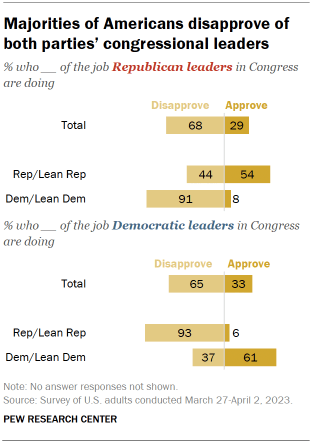
A narrow majority of Republicans (54%) approve of how their party’s leaders are doing, up from September 2021 when opinion was divided in evaluations of Republican leaders (49% approved, 49% disapproved).
Among Democrats, roughly six-in-ten (61%) say they approve of the job their party’s congressional leaders are doing. This is down from the 67% who said this in fall 2021.
When it comes to working with the opposing party in Congress, neither the Biden administration nor GOP congressional leaders are viewed positively. About four-in-ten Americans (42%) say the Biden administration is doing too little to work with Republicans in Congress. Just 5% say it is doing too much, 22% say it is doing the right amount and about a third (31%) say they are not sure.
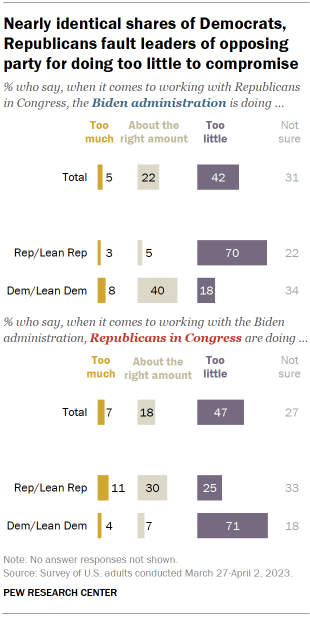
The public has nearly identical views about how congressional Republicans are working with the Biden administration: 47% say they are doing too little, only 7% say they are doing too much and 18% say they are doing about the right amount; 27% say they are not sure.
Nearly identical majorities of both Republicans and Democrats say that the other party is doing too little to work with their side: 70% of Republicans say the Biden administration is doing too little to work with Republicans in Congress, while 71% of Democrats say congressional Republicans are doing too little to work with Biden.
Partisans are more divided in views of how leaders in their party are doing in working with the opposing party, with roughly a third of Democrats (34%) and Republicans (33%) saying they are not sure.
Views of congressional investigations into the Biden administration
As Republicans in the House of Representatives begin investigations into Biden and his administration, a majority of Americans express doubt in the fairness of these probes. Nearly six-in-ten (59%) say they are not confident that investigations into the Biden administration by House Republicans will be fair and reasonable, including 26% who are not at all confident. About four-in-ten (39%) say they are confident these investigations will be fair, with 13% saying they are very confident of this.
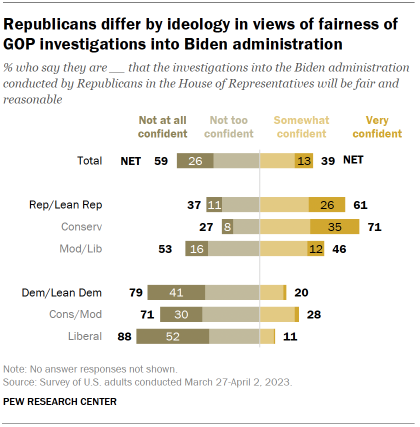
Republicans are much more likely than Democrats to have confidence that the investigations will be fair and reasonable: a 61% majority say they are very (26%) or somewhat (35%) confident in the investigations, while 37% say they are not too or not at all confident.
Among Democrats, a larger majority (79%) say they are not confident in the investigations, including 41% that are not at all confident. Just 20% of Democrats say they are confident the investigations into Biden will be fair.
And while there are ideological divisions within each party, they are more pronounced among Republicans. A 71% majority of conservative Republicans say they are confident that investigations of the Biden administration will be fair, including 35% who are very confident of this. Among moderate and liberal Republicans, 46% say they are confident, while 53% are not confident in the investigations.
Views of the Supreme Court
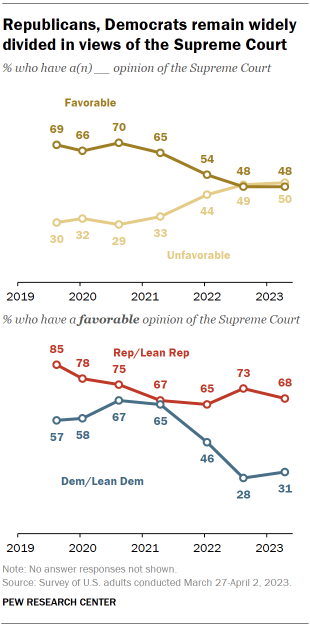
The public’s ratings of the U.S. Supreme Court continue to be evenly divided. Half of adults say they have an unfavorable opinion of the court, while 48% say they have a favorable opinion. Views of the Supreme Court are little changed from August 2022 and are much lower than in recent years when roughly two-thirds of the public expressed a favorable opinion of the court.
About two-thirds of Republicans (68%) say they have a favorable view of the Supreme Court, while 31% of Democrats say the same. This gap is somewhat smaller than in August 2022, when 73% of Republicans and 28% of Democrats said they had a favorable opinion of the court, but is still wider than any other point in the last few years.
As noted last August, most of the recent decline in views of the court have been driven by Democrats. As recently as two years ago, nearly identical shares of Republicans (67%) and Democrats (65%) viewed the court favorably. Today, there is a 37 percentage point difference in positive views.
Views of the high court also differ across demographic groups, including race and ethnicity and age.
About six-in-ten Black adults (61%) have an unfavorable view of the Supreme Court, the highest of any racial or ethnic group. About half of Asian (55%), White (50%) and Hispanic adults (47%) have a favorable view of the court.
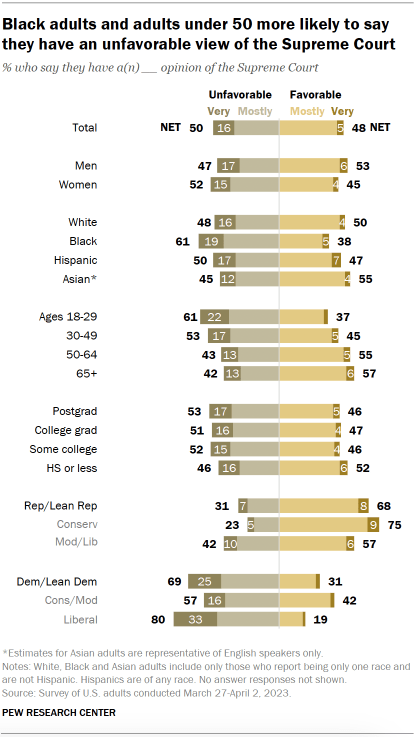
Adults 50 and older are more likely than those who are younger to have favorable views of the court: 56% of those 50 and older have a favorable view of the court, compared with 45% of those ages 30 to 49 and 37% of adults under 30.
There are also ideological gaps within each party on views of the Supreme Court.
Among Republicans, three-quarters of conservative Republicans hold a favorable view of the court, while a smaller majority of moderate and liberal Republicans (57%) say the same.
Eight-in-ten liberal Democrats hold an unfavorable view of the court, along with 57% of conservative and moderate Democrats. Liberal Democrats are about twice as likely as conservative and moderate Democrats to hold very unfavorable views of the court (33% vs. 16%).
Little public confidence in the political wisdom of their fellow Americans
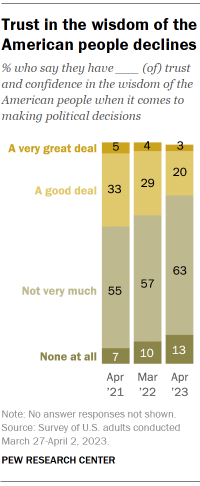
About a quarter of adults (23%) say they have at least “a good deal” of trust in the wisdom of the American people when it comes to making political decisions, compared with 76% who have either “not very much” (63%) trust in their fellow Americans’ political wisdom or “none at all” (13%).
The share who have a good deal or a very great deal of trust in the wisdom of the people is down 10 percentage points since last spring (when 33% said this) and 15 points over the past two years (from 38% in April 2021).
Nearly identical shares of Republicans (23%) and Democrats (24%) say they have a very great deal or a good deal of trust in the political wisdom of the American people; most in both parties (77% of Republicans and 75% of Democrats) express not very much or no confidence in the political wisdom of other Americans.
As recently as 2007, Pew Research Center surveys conducted by telephone found majorities of adults reporting at least a good deal of trust in the political wisdom of the American people. The share reporting this had declined precipitously by 2015 and remained low in phone surveys over the course of the next several years.


